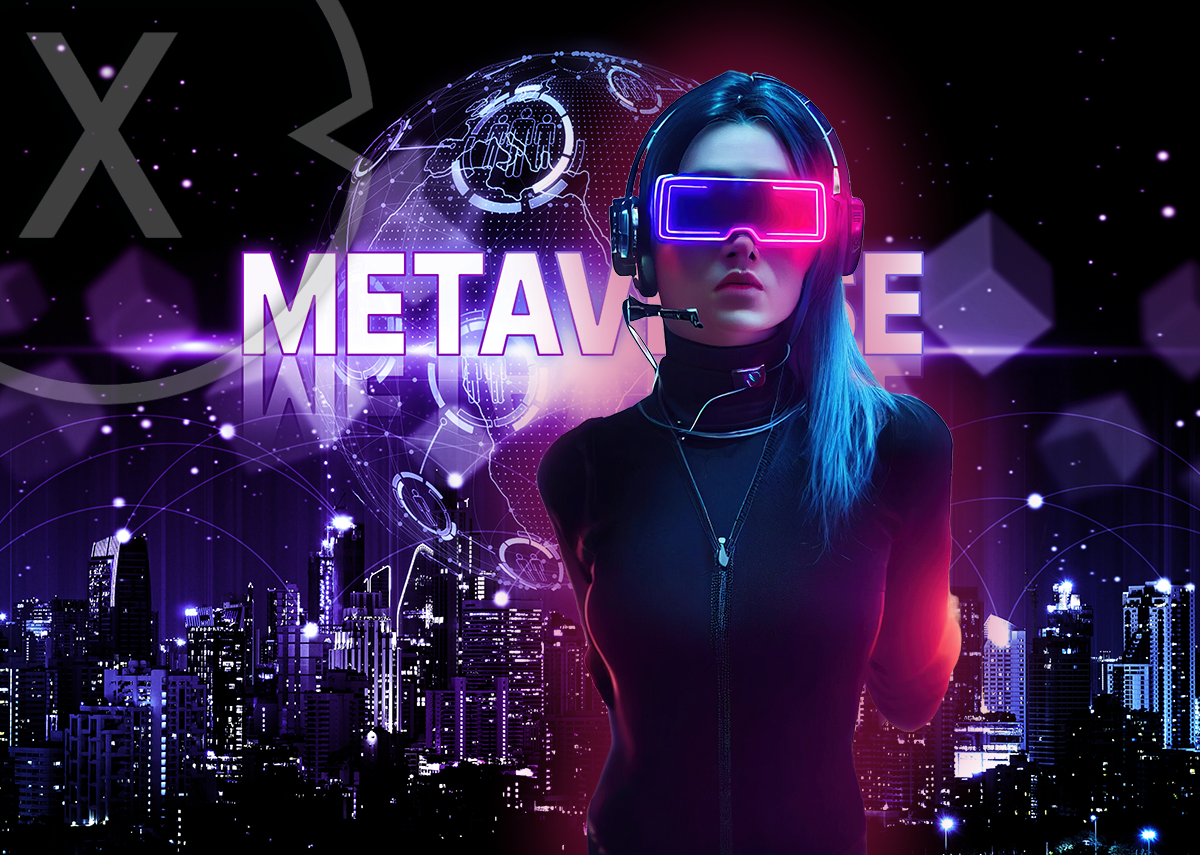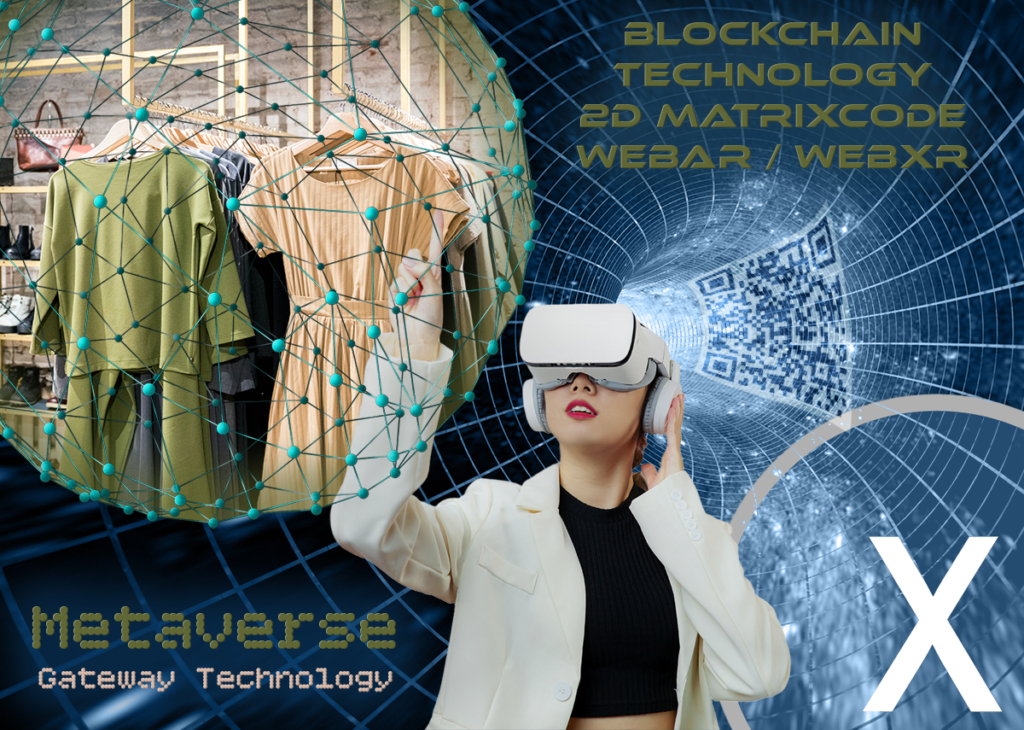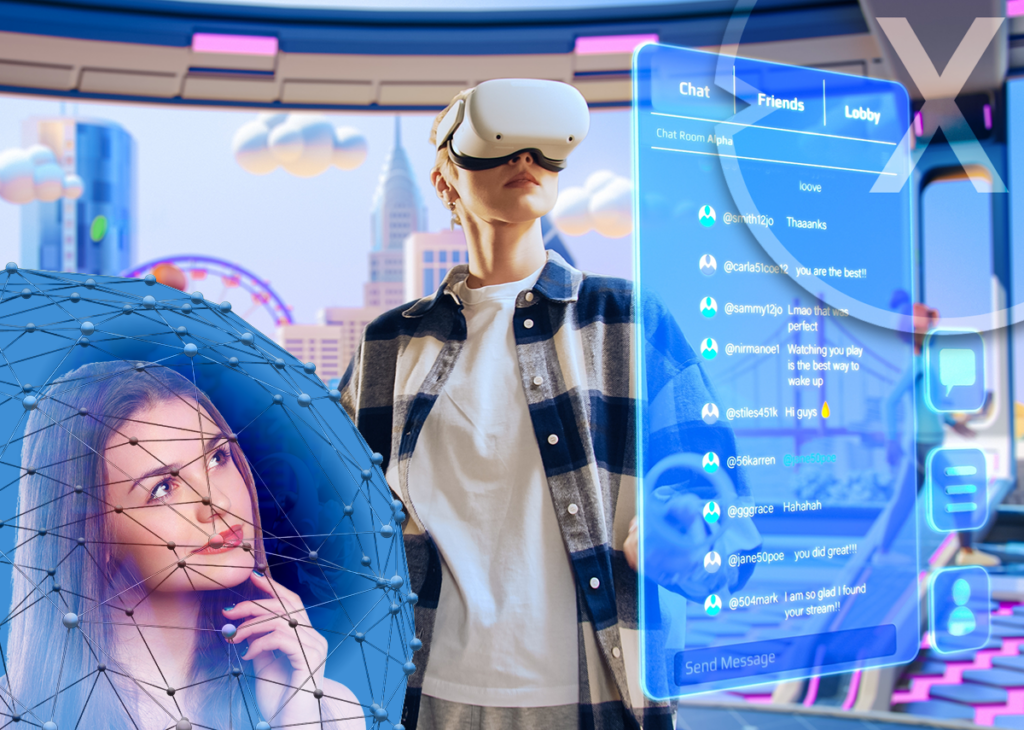Metaverse in China – Insight into the augmented, extended, virtual and mixed reality of the Chinese XR technology industry
Language selection 📢
Published on: October 8, 2023 / update from: October 9, 2023 - Author: Konrad Wolfenstein
🌐🇨🇳 # The virtual future and China's national strategy for the metaverse
📖🌟 A guide for the digital tomorrow
China's Metaverse strategy is much more than just a gimmick in the digital world. It is intended to serve as a catalyst for the country's real economy. Numerous cities and provinces in the Middle Kingdom have already launched budget plans and training programs to fully exploit the potential of the Metaverse in existing industries.
More about it here:
🏁🔬 The race for technology and patents
Beijing launched China's first Metaverse patent pool in recent months. This venture, part of the capital's ambitious plans, aims to attract over 100 companies to the Metaverse space by the end of 2024. The pool already contains around 170 specialized patents. But Beijing is not alone; numerous other Chinese cities also want to become hubs for this groundbreaking technology.
🗺️📈 Strategic plans and economic impulses
The Chinese Ministry of Industry and Information Technology has recently published a three -year plan for an “industrial meta -verse”. This initiative makes Metaverse technology a cornerstone of the national strategy. The goal is to build a flourishing digital economy that further supplements the existing, already impressive economy that is only exceeded by the USA.
💼📊 Benefits for the real economy
China's focus on metaverse is not only technology -driven, but also has clear economic advantages in view. Deng Jian-Peng, a recognized specialist in financial technology law and professor at the Central University for Financial and Economics in Beijing, emphasizes the practicality of meta-verse in existing industries. As a prime example, he mentions BMW's “industrial meta verse”, developed by NVIDIA, which represents a digital replica of the car manufacturer's production line. These can optimize production processes and reduce costs.
In line with this topic:
🔮⚖️ The path to the future: challenges and opportunities
Despite the optimism, there are also challenges. Regulating the digital world and dealing with global competition are just two of the many aspects that need to be taken into account. Privacy protection and ethical considerations could prove to be hurdles in implementing the Metaverse plans.
🔒📊 The role of the social credit system
A special development is the integration of the Chinese social credit system into the metaverse. Although this may seem dystopian to some, it could pave the way for a new type of social order and interaction in both the real and virtual worlds.
👩🏫🌍 The added value for society
The impact of the Metaverse is not just limited to economics. Training and education could be revolutionized by replacing traditional classrooms with more immersive, interactive experiences. Health services could be improved through telemedicine and virtual reality, and social cohesion could be strengthened through shared virtual experiences.
📝🌐 China wants to become a leading player in the metaverse
China's quest to become a leading player in the metaverse is a complex undertaking that goes far beyond technological innovations. It offers both immense opportunities and challenges and could take the country a big step forward on its path to global technology and economic leadership. Integrating the Metaverse into existing industries and social systems could not only boost the economy, but also open up new opportunities for society as a whole.
📣 Similar topics
1️⃣ China's vision for the metaverse: More than just virtual reality
2️⃣ Catalyst for the economy: China's meta-severse strategy
3️⃣ Peking Patents: The race for meta-verse technologies
4️⃣ A three-year plan for the “industrial meta-verses” in China
5️⃣ The practicality of the meta-verse: Economic advantages and examples
6️⃣ Ethics: The challenges of the Metaverse in China
7️⃣ Social loan system in metaverse: utopia or dystopia?
8️⃣ Educational revolution through the metaverse: The Chinese approach
9️⃣ Telemedicine and virtual reality: healthcare in metavers
🔟 China's complex undertaking: the way to global technology and economic management through meta-severse
#️⃣ Hashtags: #MetaverseInChina #TechnologyRace #IndustrialMetaverse #Social Credit System #EducationRevolution
🗒️ Xpert.Digital: A pioneer in the field of extended and augmented reality

Find the right Metaverse agency and planning office such as a consulting firm - Image: Xpert.Digital
🗒️ Find the right Metaverse agency and planning office such as a consulting firm - search and search for top ten tips for consulting & planning
In the age of digitalization, where technologies such as Extended Reality (XR) and the Metaverse are constantly becoming more relevant, Xpert.Digital positions itself as an opinion leader and pioneer. With over 1,500 specialist articles, Xpert.Digital has established itself as a central point of contact for the industry.
🌌 Extended Reality (XR): The best of both worlds
Extended Reality is a collective term that includes virtual reality (VR), mixed reality (MR) and augmented reality (AR). Xpert.Digital is committed to creating immersive XR experiences that are both informative and entertaining.
- Interactive Experiences: XR allows users to immerse themselves in virtual worlds and interact with their surroundings in ways previously unimaginable.
- Education and Training: XR can be used for educational purposes to convey complex topics and concepts in an understandable and tangible way.
- Entertainment: Whether games, films or art – XR opens new horizons in digital entertainment.
🔮 Augmented Reality (AR): See the world through digital eyes
Augmented Reality, a particular focus of Xpert.Digital, makes it possible to integrate digital information or graphics into the real world. The possibilities are nearly unlimited.
- Marketing and Advertising: AR can be used to create interactive advertising campaigns that engage customers in a whole new way.
- Everyday help: From navigation apps that project the route directly onto the street to furniture apps that show what a new sofa would look like in the living room - AR makes it possible.
🌐 The Metaverse: The Next Big Thing
The Metaverse is a virtual world where people can interact through avatars and create shared experiences. Xpert.Digital recognizes the enormous potential of the Metaverse and is working to translate this potential into usable products and services.
- Social Interaction: The Metaverse offers the opportunity to connect with people from all over the world and share common experiences.
- Economy and trade: Virtual goods and services can be traded in the metaverse, which opens up completely new business models and sources of income.
- Creative Freedom: From building your own worlds to designing custom avatars, the Metaverse is a place of endless creative possibilities.
🚀 Xpert.Digital at the forefront of innovation
Xpert.Digital shows how a company can be at the forefront of the technological revolution. With their focus on XR, AR and the Metaverse, they are well positioned to shape and define the future of digital interaction.
More about it here:
🌏 China's Strategy for the Metaverse: A Balancing Act Between Economics and Regulation
🏭 A metaverse focused on the real economy
China has ambitious plans for the Metaverse, specifically aimed at strengthening the real economy. At the beginning of this year, the financial metropolis Shanghai presented a series of 20 application scenarios for the Metaverse, which are expected to be implemented by the end of 2025. These projects are diverse and reflect the diverse sectors of the Chinese economy. From the virtual representation of a state steel mill, to a metaverse hospital that enables remote treatment, to educational scenarios that promise a seamless transition between virtual and real learning.
🚫 No open Metaverse game worlds
Interestingly, the Chinese government has made it clear that it does not plan to promote open meta-verse game worlds such as “Decentraland” or “Sandbox”. This indicates a more pragmatic than playful approach to the meta verse. Zhao Xing, a leading researcher at the Fudan University in Shanghai, emphasizes that the Chinese Metaverse initiatives focus strongly on real applications. The goal is to cope with current challenges in technology, industry and administration through the use of the meta verse.
🏢 The role of companies
Companies play a crucial role in this development. A remarkable collaboration took place between liquor giant Kweichow Moutai and tech company NetEase. They've launched a wine-themed metaverse and even issued NFTs (non-fungible tokens) tied to real bottles of fine liquor. This shows that the business world recognizes the opportunities that the metaverse offers to advance the real economy.
🔒 Regulatory concerns and cryptocurrencies
Another characteristic of the Chinese Metaverse strategy is the cautious approach to cryptocurrencies and NFTs. While open metaverses often use cryptocurrencies like SAND to incentivize users, China emphasizes the need to comply with financial regulators' standards. This is also because the use of cryptocurrencies and NFTs in China comes with significant legal and political risks.
🔮 China aims for leadership role
Looking ahead, it is clear that China is seeking a leadership role in the evolving metaverse. After missing some opportunities in the early years of the Internet, mobile web and artificial intelligence, both the government and business see the Metaverse as an opportunity to catch up and take a leadership role. China's metaverse strategy is also expected to have an impact on the international stage. It is conceivable that they will try to set standards, especially when it comes to integrating social or economic systems such as the Chinese social credit system into the metaverse.
💻 The role of technology
Technologically, China will likely play an important role in the development of the Metaverse. With the massive emergence of 5G networks, cloud computing and artificial intelligence, China has the technological foundations to create a robust and diverse metaverse. Therefore, Chinese technology companies are expected to play an important role not only in the domestic market but also internationally.
🔍 Pragmatic metaverse for the real economy
China's approach to the metaverse is pragmatic and heavily focused on the real economy. It shows how a country can use the metaverse as a tool to solve real-world problems and provides a glimpse into the possible future of this new digital landscape. The balance between innovation and regulation plays a crucial role. The Chinese Metaverse strategy could therefore represent an interesting model for other countries that want to get involved in the development of this new technology.
📣 Similar topics
1️⃣ China and the real economy: Metaverse as a growth engine
2️⃣ Pragmatism in the Chinese Metaverse: No room for games?
3️⃣ Shanghai as a Metaverse pioneer: 20 application scenarios by 2025
4️⃣ Cryptocurrencies and NFTs: China's cautious approach
5️⃣ Companies in focus: Kweichow Moutai meets NetEase in the Metaverse
6️⃣ China's technological foundations for the Metaverse
7️⃣ The Chinese strategy: Global effects of the Metaverse
8️⃣ Regulation and Innovation: China's Balancing Act in the Metaverse
9️⃣ Education and Health: Metaverse Applications Beyond Entertainment
🔟 Social Credit System in the Metaverse: China's Vision for Digital Society
#️⃣ Hashtags: #ChinaMetaverseStrategy #RealEconomyInMetaverse #CorporateCooperations #RegulationAndInnovation #TechnologyInMetaverse
🛒 V-Commerce: The ingenious hybrid shopping model 🛍️ Also applicable for hybrid trade fairs 🎪🤝 and events 🌐🎉
V-Commerce, a combination of “virtual” and “commerce”, is a new hybrid model for retail that can also easily be used at hybrid trade fairs and events. Imagine blurring the lines between online and offline shopping, opening up endless possibilities for buyers and sellers alike. This model can also be used as a cross-border solution, which makes it particularly interesting for internationally operating companies.
More about it here:
🇨🇳 China's national metaverse strategy 🌐: A metaverse with Chinese characteristics 🐉
⚖️ Regulatory background and challenges
The digitization of the financial world, in particular the “financialization” of digital assets, is a challenge for China's supervisory authorities. In 2017, ICOS (Initial Coin Offerings) was banned, and 2021 followed a general ban on trading for cryptocurrencies. The reasons are diverse and range from concern for the financial stability to the government's control needs.
As a result, public blockchains such as Ethereum and Solana are less popular in China. Instead, politicians favor private or permissioned blockchain networks that do not use cryptocurrencies. These networks are controlled either by a single company or by a consortium of companies. The advantage for the supervisory authorities is that such systems are easier to control.
🔄 Adaptability of Chinese regulation
Despite the strict stance on cryptocurrencies and public blockchains, the Chinese government may relax or adjust its regulations in the future. Hong Kong, for example, introduced new regulations for cryptocurrency trading on June 1st. These could serve as an experiment for a possible relaxation of regulations in mainland China.
The development is reminiscent of the 1980s economic reforms in Shenzhen, which served as an experiment for greater economic openings across China. The risks and opportunities presented by Hong Kong's rule changes could provide important insights for policymakers in Beijing.
🛠️ Future plans and technology strategies
Furthermore, public blockchain technology is not completely ignored in China. For example, the Shanghai government has released a three-year technical research plan in the blockchain industry. This plan includes promoting not only consortium blockchains, but also public blockchains. In addition, interoperability between differently structured blockchain networks is viewed as an important goal.
🌐 The Metaverse under Chinese supervision
When it comes to the Metaverse, China is showing a growing interest in shaping this digital universe according to its own rules. The goal is to develop a metaverse with “Chinese characteristics”. This means that the Chinese metaverse is likely to be subject to strict regulations and surveillance, similar to other areas of digital life in China.
👥 Social points and digital identity
One of the concepts being discussed for the Chinese metaverse is the introduction of a digital identity system. This could be related to the social credit system that already exists in China. So in the Chinese metaverse, social points and penalties could play an important role.
🏢 Role of big tech companies
Large Chinese technology companies such as Tencent and Alibaba are already relying on Metaverse technology. They could become important players in the development of a Chinese metaverse that takes commercial as well as social and cultural aspects into account.
🔚 Open questions
China's national metaverse strategy is complex and influenced by various factors: from regulatory caution to adaptability to the involvement of large technology companies. While many questions remain, one thing is clear: China intends to play a significant role in the global metaverse, but in its own unique way.
📣 Similar topics
- 🇨🇳 China's Cryptocurrency Ban: What It Means
- 🏦 Digital Asset Regulation in China: An Overview
- 🌐 China's path to its own metaverse
- 🔗 Private vs. Public Blockchains: China's Preferences
- 🌉 Hong Kong's new crypto regulations: An experiment for China?
- 📈 Shanghai's three-year blockchain research plan
- 🕵️♂️ Surveillance in the Chinese Metaverse: What to Expect
- 🎮 Tencent and Alibaba: Key players in the Chinese metaverse
- 📊 Social credit system in the digital universe: China's plans
- 🛠️ Blockchain Interoperability: China's Strategic Goals
#️⃣ Hashtags: #ChinasMetaverse #CryptoRegulation #DigitalIdentity #TechCompanies #BlockchainStrategies
Our Industrial Metaverse configurator
Just try out our universally applicable (B2B/Business/Industrial) Metaverse configurator for all CAD / 3D demo options:
Xpert (B2B/Business/Industrial) Metaverse configurator for all CAD / 3D data can be used on all devices, one platform!
Suitable for:
🇨🇳🌐 China's Fascination with the Metaverse: A National Vision
📌 The Metaverse as a technology trend
The hype surrounding the Metaverse has increased worldwide in recent years, and China is no exception. The country sees this virtual reality not only as a technological innovation, but also as an opportunity to stimulate the real economy. The Chinese government is therefore working on a national metaverse strategy that will prepare both the public and the economy for this future-oriented concept.
🏢🗺️ National strategies and local initiatives
In China, enthusiasm for the Metaverse is unbridled, despite the fact that a national strategy is still in the works. Several provinces and cities, from major metropolises like Beijing and Shanghai to lesser-known cities like Jinan and Zhengzhou, have already unveiled their own plans and policies. Amid varying economic conditions, these local governments have similar goals: They each want to attract at least 100 Metaverse companies or develop at least 30 exemplary use cases for the Metaverse.
👥💰 Internal rivalry and economic incentives
Competition among local government officials has only fueled the hype surrounding the Metaverse in China. The economic performance of a region or city has a direct impact on the career opportunities of its decision-makers. Therefore, financial incentives are often part of the strategy: For example, the city of Zhengzhou has promised start-up capital of up to 200 million yuan (about 28.34 million US dollars) for Metaverse companies that move their headquarters to the city.
⚠️🌿 Critical voices and sustainability
However, there are also critical voices that warn of the potential dangers of hasty development. Deng, an expert in the field, argues that a hasty release of Metaverse guidelines by too many regional governments could harm the industry. Instead, he advocates promoting the technology first in first-class cities such as Beijing, Shanghai, Guangzhou, Shenzhou and Hangzhou. These could then serve as models to gradually introduce the technology across the country.
🇨🇳🔍 The Chinese touch: Metaverse with country-specific properties
In China, it is likely that the Metaverse will have some unique, country-specific characteristics. For example, China's social credit system, a tool for monitoring and controlling citizens, could be integrated into the virtual world. This would add an additional layer of complexity to the Chinese metaverse that does not exist in other countries.
📈🔗 The economic dimension
Chinese interest in the Metaverse is not only technology-driven, but also strongly economically motivated. The country sees this as a new wave of innovation that could help boost the national economy. By fostering metaverse companies and developing use cases, China could take a leading role in this new industry, similar to what it is already doing in other technology areas.
🛣️🔮 The path to the future
The Metaverse is still in its early stages of development, and many questions remain unanswered. But what is already clear is China's ambition to play a leading role in this area. Through a combination of national strategy, local initiatives, financial incentives and adaptation to country-specific needs and circumstances, China is trying to make the most of the metaverse trend for its own goals. To what extent this will be successful remains to be seen, but one thing is certain: the metaverse in China will have an exciting development that is worth watching.
📣 Similar topics
1️⃣ China's National Metaverse Strategy: A Look Ahead
2️⃣ Beijing vs. Shanghai: Comparing Local Metaverse Initiatives
3️⃣ Economic Incentives: How China Promotes the Metaverse
4️⃣ Internal Rivalry: The Role of Local Governments in the Chinese Metaverse
5️⃣ Critical Perspectives: The Dangers a hasty Metaverse development in China
6️⃣ The Chinese touch: Social credit system in the Metaverse
7️⃣ Financial incentives for Metaverse companies in China
8️⃣ The Metaverse as an economic engine: China's vision for the future
9️⃣ The role of world-class cities in the Chinese Metaverse
🔟 From technology to business: China's Multidimensional Metaverse Strategy
#️⃣ Hashtags: #ChinaMetaverse #NationalStrategy #EconomicIncentives #LocalInitiatives #CriticalPerspectives
🗒️ If you don't understand something or need advice, we also offer training and workshops

Metaverse & Extended Reality training, lecture or workshop for augmented, mixed and virtual reality – Xpert.Digital
In today's digital era, technology is evolving at a rapid pace. There are constantly new terms and technologies that need to be understood and mastered. If you're having trouble keeping up with topics like Metaverse, XR technologies, or immersive 3D, you're not alone.
More about it here:
🌐 Metaverse and technology companies in China
Many technology companies worldwide concerns the question of how the metaverse will develop. In China, however, there is a worrying pattern that is illustrated by a number of developments. One of the most prominent players, Tencent, has made a “personal restructuring” in his extended reality department, which deals specifically with the meta verses. This change was interpreted by some as a sign that the company could reduce its ambitions in the field of meta -verse.
💼 Corporate strategies in a global context
This comes against the background that international companies such as Meta and Disney are also rethinking their Metaverse activities. Meta recently reported billions in losses, while Disney has put its plans on hold for the time being. In a similar twist, Baidu, the Chinese equivalent of Google, has withdrawn from the Metaverse scene. A prominent project manager left the company, citing insufficient profitability and strategic focus on artificial intelligence as the main reasons.
❓ Complexities and challenges
These facts raise some interesting questions. On the one hand, they suggest that building an immersive metaverse is enormously complex and requires significant investments in hardware, software, and talented researchers. So far, the Metaverse experiences created by Tencent and Baidu have failed to meet users' expectations. This could indicate that the technology or concept itself is not yet fully developed.
🌐💻 Technological dependencies
Another obstacle for Chinese companies is their reliance on high-performance computer CPUs, manufactured primarily by U.S. companies like Nvidia. Given the geopolitical tensions between the US and China, it may be difficult for Chinese companies to access the necessary resources. This is even more problematic because the US dominates the global supply of microchips, which are an essential part of the computing power required.
🌏 Asian perspectives: Japan and South Korea
In contrast, Japan and South Korea are in a cheaper position because they benefit from friendlier business environments and regulations. Your respective approaches to the metaverse could also be better adapted to the respective national interests and capacities. South Korea focuses more on the “virtual space” approach, which is similar to Mark Zuckerberg's vision of Meta, while Japan focuses on Web 3.0 and digital assets.
🇨🇳 China's unique advantages
But despite these challenges, China has some unique advantages. The country has a massive user base and significant financial resources. If these are used properly, China could be able to build a robust, self-contained Metaverse ecosystem. In addition, the Chinese government is known for investing heavily in promising technologies and could therefore act as an important enabler for the development of the Metaverse in China.
🔮 Future prospects and opportunities
The different approaches of the three Asian countries could ultimately contribute to a more diverse and rich metaverse landscape. It is hoped that these different approaches could one day merge to allow for a more comprehensive definition and realization of the Metaverse. While the challenges are significant, the opportunities are also immense. What is certain is that the Metaverse will continue to be a competitive and fascinating field in which both companies and countries will fight to reach the top position. And in this complex, rapidly changing environment, the key to success may lie in remaining flexible and adaptable.
📣 Similar topics
- Tencent and the Metaverse Future: A Turning Point? 🇨🇳🌐
- Metaverse: The rise and fall of major players 📈📉
- Geopolitical challenges in the metaverse 🌍💻
- The Impact of CPU Supply on China's Metaverse Ambitions 🇨🇳🔌
- Disney and Meta: Rethinking the Metaverse 🏰🌐
- Baidu retreats: AI vs. Metaverse 🤖🇨🇳
- Japan and South Korea: Alternative Visions of the Metaverse 🇯🇵🇰🇷
- Metaverse: Is the technology really mature? 🌐💡
- China's financial resources and the metaverse 🇨🇳💵
- Flexibility: The Key to Metaverse Success 🗝️🌐
#️⃣ Hashtags: #Metaverse #ChinaTech #Geopolitics #CorporateStrategy #AsiaInMetaverse
🗒️ New territory for newbies: What you should know now about blockchain, tokens, NFTs, wallets, cryptocurrency and the metaverse
In today's digital world, terms such as blockchain, NFTs, wallets, cryptocurrencies and the metaverse have become increasingly present. For newcomers, these terms may seem confusing and complex at first. Here we try to explain these terms in an understandable way and give you important and interesting details about them.
More about it here:
🌐🇨🇳 The complexity of the relationship between local governments and the metaverse in China
The interaction between local governments and the development of the metaverse in China is a topic of far-reaching importance that requires careful analysis. This relationship reflects not only the country's ambitions in technology, but also the complex challenges that can arise from rapid development. There is often a kind of internal rivalry between different provinces and cities, all trying to become number one in the emerging Metaverse market.
🏙️🛠️ Internal Rivalry: The Role of Local Governments in the Chinese Metaverse
The local government plays an essential role in promoting technology and innovation in China. This is no different when it comes to the development of the Metaverse, a virtual space created by the fusion of physical reality and digital worlds. Various regions such as Shenzhen, Beijing and Shanghai are trying to create incentives for companies operating in this area. These include tax benefits, special economic zones and the provision of infrastructure.
📉💡 Critical Perspectives: The Dangers of Rushed Metaverse Development in China
While China's ambitions in the Metaverse space are impressive, it is essential to consider the potential dangers of hasty development. Key concerns include data security, privacy and social justice issues. Since the Metaverse is a space where large amounts of personal data can be stored, the potential for misuse is enormous. The issue of data protection is further complicated by the authoritarian nature of the Chinese government.
📊🔒 Social and Ethical Concerns: Inequality and Escapism in the Metaverse
In addition, socio -economic inequalities that exist in the physical world could be transferred to the meta verse. For example, people in the poorer regions of the country could not have access to the advantages of metaverse, since the required technology and infrastructure are missing. This could lead to a further deepening of the gap between the “Haves” and the “Have notes”.
There are also ethical concerns in connection with the escape of reality that can offer metavers. In a society in which working pressure and social stress are often high, the tempting aspect of a “different world” could lead to people neglecting the challenges and responsibilities of the real world.
🔍🌐 Balancing opportunities and risks in the Chinese metaverse
The role of local governments in the Chinese metaverse and the dangers associated with it form a complex and multi-layered issue. On the one hand, regional competitive advantages drive technological innovation. On the other hand, internal rivalry between local governments can lead to fragmentation and inefficiency. At the same time, rapid development must not come at the expense of data security, data protection and social justice.
Therefore, the sustainable development of the Chinese metaverse requires careful planning and coordination that takes into account not only the technological aspects but also the social and ethical challenges. This is the only way China can take advantage of the enormous opportunities presented by the Metaverse without overlooking the potential dangers and negative impacts on society. This requires close collaboration between government agencies, technology companies and civil society to ensure that the development of the Metaverse is in line with the values and interests of the Chinese people. In addition, China should also keep in mind international standards and best practices to promote global integration of the metaverse while maintaining national sovereignty.
📣 Similar topics 2023
- China's Metaverse Ambitions 🇨🇳🌐
- Regional competitive advantages and technology 🏙️💡
- Data security in the metaverse 🛡️📊
- Socioeconomic inequalities in the digital space 💰🌐
- Ethics and escapism in the Metaverse 🌌🤖
- Internal Rivalry: China's Metaverse Market 🔀🇨🇳
- Local governments as drivers of innovation 🏛️🚀
- Metaverse development and data protection 📈🔒
- China's ambitious metaverse goals 🎯📱
- Sustainable development in the metaverse 🌱🌏
📣 Similar topics 2024
1️⃣ Regional Rivalries in the Chinese Tech Sector
2️⃣ Metaverse in China: Growth or Danger?
3️⃣ The Role of Local Government in China's Tech Boom
4️⃣ Data Security in the Metaverse: A Chinese Perspective
5️⃣ Tax Benefits and Economic Zones: Incentives for Metaverse Companies in China
6️⃣ Social Justice in the Digital Age: China's Metaverse
7️⃣ Fragmentation vs. Unity: Challenges in the Chinese Metaverse
8️⃣ Ethics in the Metaverse: China's Dilemma
9️⃣ Infrastructure for the Metaverse: Local Government as a Key Player
🔟 China's Metaverse Strategy: A Balancing Act Between Innovation and Risk
#️⃣ Hashtags: #Metaverse #China #Innovation #DataSecurity #Inequality #MetaverseInChina #LocalGovernment #TechnologyCompetition #DataSecurity #SocialJustice

We are there for you - advice - planning - implementation - project management
Xpert.Digital - Pioneer Business Development
Smart Glasses & KI - XR/AR/VR/MR industry expert
Consumer metaverse or meta -verse in general
If you have any questions, further information and advice, please feel free to contact me at any time.
I would be happy to serve as your personal advisor.
You can contact me by filling out the contact form below or simply call me on +49 89 89 674 804 (Munich) .
I'm looking forward to our joint project.
Xpert.Digital - Konrad Wolfenstein
Xpert.Digital is a hub for industry with a focus on digitalization, mechanical engineering, logistics/intralogistics and photovoltaics.
With our 360° business development solution, we support well-known companies from new business to after sales.
Market intelligence, smarketing, marketing automation, content development, PR, mail campaigns, personalized social media and lead nurturing are part of our digital tools.
You can find out more at: www.xpert.digital - www.xpert.solar - www.xpert.plus



























